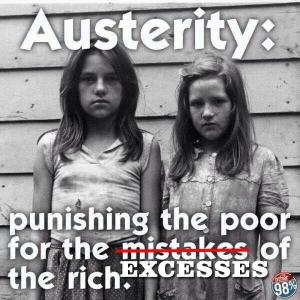Our society is divided between two extremes of opinion, more so than it has been in decades. It is division perpetuated by extreme political positions that unfortunately stand more on opinion than on reason.
We seem to be in a perpetual “debate” about how to balance the government’s budget, for example, but this debate has little to do with budget concerns and practical solutions.
The current budget debate is about government and whether we want government to support programs that help people, especially people who need the help. Yes, that sounds trite, but it is what it is. How else do you explain a government that expects the poor, for example, to receive less and less from government while non-people like corporations and their interests enjoy more and more?
One myth surrounding the so-called budget debate is this idea that we must cut spending to balance the budget. The myth supports this idea that investments in public services like Medicare and Social Security need to be cut back, regardless of their funding source. The current money-saving debate surround the farm bill includes proposals for extreme cuts for federal food assistance to the poor, as much as $40 billion in cuts.
 The truth is we don’t have to cut spending and the programs that spending supports anymore than we have to raise taxes to balance the budget. A world balanced exclusively on cuts would be an ugly, dysfunctional one, but is is an option.
The truth is we don’t have to cut spending and the programs that spending supports anymore than we have to raise taxes to balance the budget. A world balanced exclusively on cuts would be an ugly, dysfunctional one, but is is an option.
The false argument favoring government cuts claims that our spending is unsustainable. This is only true because spending has been underfunded by design. This has been a conservative strategy for decades. It is no secret, it is the Starve the Beast approach to governing.
When conservatives say we must cut, they say they don’t want to fund. Not long ago — when both our society and our economy functioned much better — we had a more balanced and much more appropriate tax policy in this country. Tax rates were higher and more fair overall. This fair and responsible approach funded public service and it worked.
Conservative budget battles are not about fiscal responsibility and deficits. They make claims that more accurately reflect a war on the poor and unfortunate than they address real budget concerns. They insist that they care about people, represent a compassionate form of government, and a lot of other baloney, but say we cannot afford it.
Cannot is a lot different from will not. We can support the public good again if we choose to do so.
 More sensible strategies might follow the best practices of our OECD peers who have found ways to control costs, specifically health care costs, a primary driver of future debt and deficit forecasts for our country. But this involves public investment, something that conservative American today inherently opposes, unless that investment — whether in direct subsidy or tax cuts — for wealth, business, and other powerful special interests.
More sensible strategies might follow the best practices of our OECD peers who have found ways to control costs, specifically health care costs, a primary driver of future debt and deficit forecasts for our country. But this involves public investment, something that conservative American today inherently opposes, unless that investment — whether in direct subsidy or tax cuts — for wealth, business, and other powerful special interests.
The argument that cutting taxes and spending is a budget balancing necessity is a bogus argument that has little to do with budgets. It is a political argument driven by a misguided anti-government ideology. “Compassionate conservativism” has destroyed enough of our country’s social fabric and infrastructure. It is time voters pay attention to real objectives of political debate.
Related articles
- About Federal Budgets… (cabdriverchris.wordpress.com)
- The Great Rip Off: The high cost of low taxes (billmoyers.com)
- Grudge Spectacle (nytimes.com)


